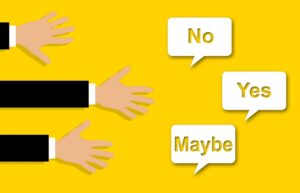Entrepreneurship is a journey that is full of challenges, and it is not uncommon for entrepreneurs to experience moments of self-doubt and a lack of motivation. However, it becomes even more challenging when the people around them are negative and tell them that they cannot succeed.
How Entrepreneurs can Stay Motivated and Focused Even when People Around them Say they Can’t Succeed
Negativity can weigh heavily on an entrepreneur’s mind – leading to a lack of focus and plenty of unnecessary second-guessing. So, let’s go ahead and discuss some strategies that entrepreneurs can use to stay motivated and focused even when the people around them are saying they can’t succeed.Believe in Yourself
The first and most important thing is to believe in yourself. You must have confidence in your abilities and trust that you are capable of achieving your goals. If you don’t believe in yourself, it will be difficult for you to stay motivated and focused when others doubt you.Surround Yourself with Positive People
Surrounding yourself with positive people who believe in you and your vision is essential. Negative people can bring you down and sap your energy. Seek out individuals who are supportive and can offer encouragement and constructive feedback.Focus on Your Vision
Stay focused on your vision and goals, and don’t allow others to deter you from your path. (This isn’t easy because we all have self-doubts and are unavoidably influenced by the opinions of others – particularly the people closest to us.)Entrepreneurs have to make a lot of tough choices each day and it can take a toll. Throughout the rest of the day, though, they tend to limit decision-making to keep things simple. It’s a great tool for motivating entrepreneurs because it keeps them sharp when their abilities are needed elsewhere. —Inc.cdomRemember that success often comes after a series of failures and setbacks, so stay the course and remain committed to your vision. If you can put failures in perspective, you’ll have a much better chance of persevering when things don’t go right.
Celebrate Small Wins
Entrepreneurship is a journey, and it is essential to celebrate small wins along the way. Recognize the progress you’ve made, no matter how small, and use it as motivation to continue working towards your goals.Take Breaks and Practice Self-Care
Running a business can be overwhelming, and it’s crucial to take breaks and practice self-care. Take time for yourself and do activities that bring you joy and help you relax. This will help you stay on task and keep your drive to succeed healthy in the long run.Keep Learning and Growing
Entrepreneurship is a continuous learning process, and it’s essential to consistently grow and develop your skills. Attend seminars, conferences, and networking events to learn from other entrepreneurs and industry leaders. This will help you stay motivated and focused as you work towards your goals.Embrace Failure
Finally, it’s essential to embrace failure as part of the learning process. Every entrepreneur has failed at some point, but what sets successful entrepreneurs apart is their ability to learn from their failures and use them as motivation to keep pushing forward.Summing it all up, staying motivated and focused as an entrepreneur can be challenging, especially when others doubt your ability to succeed. However, by believing in yourself, surrounding yourself with positive people, focusing on your vision, celebrating small wins, taking breaks and practicing self-care, keep learning and growing, and embracing failure, you can stay motivated and focused on your path to success.
What other strategies and/or attitudes would you add to this list? Please, take a few minutes to share your own thoughts and experiences so others can benefit from your perspective!
Interested in learning more about business? Then just visit Waters Business Consulting Group.




